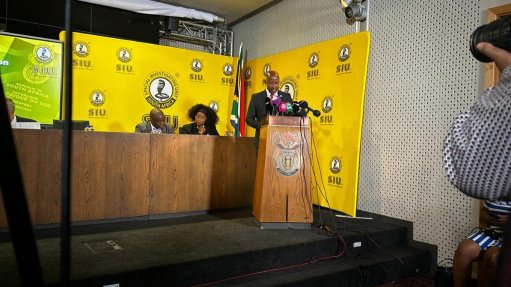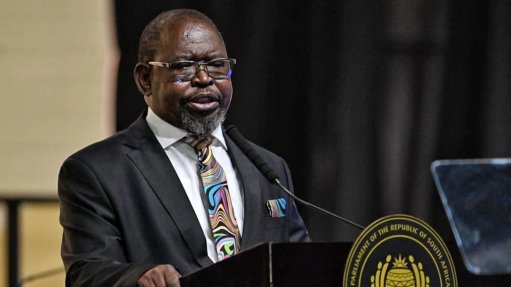SANEDI welcomes recent Denmark, Netherlands partnership to bolster hydrogen
South Africa’s plan to raise $1-billion to kickstart the country’s hydrogen economy in partnership with Denmark and the Netherlands bodes well for a new energy future, posits South African National Energy Development Institute (SANEDI) CEO Dr Titus Mathe.
The announcement that Denmark and the Netherlands would join forces with South Africa to raise $1-billion was made at a business forum held in Pretoria in June.
Mark Rutte and Mette Frederiksen, the Prime Ministers of the Netherlands and Denmark, respectively, attended the forum, which Mathe says showcases the two countries’ support for South Africa’s energy transition ambition.
He highlights that this support is well placed considering the context South Africa has already created for a hydrogen economy.
Apart from resource advantages – abundant renewable energy sources in the form of wind and solar, accessibility to sea water which could be desalinated to produce water for use in producing hydrogen using electrolysers, and the cobalt, nickel, platinum and other minerals required to produce and use hydrogen fuel cells and batteries – South Africa also has technical and knowledge advantages, Mathe acclaims.
He outlines that this includes the country’s well-developed expertise in the Fischer-Tropsch technology and the production of synthetic fuels, which can be transferrable to green hydrogen technology.
“As an energy carrier, hydrogen is already used in a range of applications in South Africa (albeit currently produced from fossil fuels), and as such, its safe storage and transport is well understood.
“The country also has an established manufacturing sector and a vast labour force that is ‘completely trainable’, in the words of our Green Hydrogen Commercialisation Strategy. All of this means the country has the potential to decarbonise traditionally hard-to-abate sectors, such as heavy-duty transport, aviation and shipping, and industries such as steel, cement and ammonia/fertiliser manufacturing,” Mathe acclaims.
He says that, acting on this potential, South Africa started investing in hydrogen research, development and innovation more than 12 years ago through a programme called Hydrogen South Africa (HySA).
More than R500-million has since been invested in research and development activities, leading to South Africa developing intellectual property such as membrane electrode assemblies and the integration of systems in the various sectors of the hydrogen economy, Mathe informs.
For example, he highlights that, during the Covid-19 pandemic, South Africa powered a field hospital using hydrogen fuel cells that combined national and international intellectual property.
Mathe notes that, over the past few months, Infrastructure SA, a programme within the Ministry of Public Works and Infrastructure, identified a pipeline of 19 green hydrogen projects valued at more than R300-billion.
The Industrial Development Corporation (IDC) also secured €23-million in grant funding from the German government to support the development of South Africa’s green hydrogen economy and help accelerate the country’s transition to renewable energy, he adds.
On an international level, the Carbon Border Adjustment Mechanism states that any product manufactured outside the European Union using “dirty energy” will be subject to a significant carbon tax.
Given that South Africa is a substantial exporter of products such as steel, cement and fertiliser, carbon neutrality and products produced using renewable energy and green energy carriers will do much to secure and grow the country’s export markets, Mathe avers.
He adds that the knock-on effect on these and other value chains will create considerable economic benefits, including job creation and mega-infrastructure development in underdeveloped areas.
From a domestic point of view, several policies are in place to support South Africa’s participation in the hydrogen economy.
Mathe says these include the Department of Transport’s Green Transport Strategy and the Department of Mineral Resources and Energy’s Just Energy Transition framework, which advances the production and use of hydrogen in the electricity sector, and the South African Renewable Energy Masterplan which encourages the use of green hydrogen.
In June 2021, Trade, Industry and Competition Minister Ebrahim Patel established the Green Hydrogen Commercialisation Panel, which is led by the IDC.
The panel has private and public sector members and, drawing on the Department of Science and Innovation’s (DSI’s) HySA programme and Hydrogen Society Road Map, developed South Africa’s Green Hydrogen Commercialisation Strategy and Action Plan, which was approved by Cabinet in 2022, Mathe explains.
Mathe emphasises that policy, and research and development require implementation, and that SANEDI can play a key role here.
He explains that the announcement of Dutch and Danish support for the $1-billion fundraising effort aligns with SANEDI’s five-year strategic plan and the current financial year’s performance plan.
“The conditions of this collaboration must, however, be well understood before South Africa commits to a long-term plan,” Mathe stresses.
He says that in terms of the five-year plan, SANEDI will champion and drive the demonstration and introduction of innovative renewable energy solutions in South Africa, including cleaner fossil fuels and cleaner mobility.
SANEDI also supports the DSI’s Energy Secretariat in managing research and development projects, with a strong focus on the hydrogen economy, and is establishing a knowledge base in collaboration with the Deutsche Gesellschaft für Internationale Zusammenarbeit, Mathe notes.
“While the green hydrogen future is bright, it would be foolish to ignore the challenges that must be managed. Green hydrogen is three to four times more expensive than grey hydrogen, which poses significant funding stumbling blocks, a challenge that is exacerbated by the need to repurpose resources and facilities that may be left stranded in the transition to a hydrogen economy.
“In addition, South Africa needs to establish standards and norms that directly address large-scale hydrogen storage and transportation (including hydrogen pipeline infrastructure), develop sufficient specialised skills and local manufacturing capacity and capabilities, provide certainty on intellectual property ownership, and resolve electricity grid constraints,” Mathe points out.
“These are not small matters to address and resolve. However, given the groundwork that has already been done, local advantages that already exist, the willingness of the international community to support the development of South Africa’s hydrogen economy and the immense benefits it could deliver, it is an opportunity that must be pursued wholeheartedly,” he concludes.
Article Enquiry
Email Article
Save Article
Feedback
To advertise email advertising@creamermedia.co.za or click here
Press Office
Announcements
What's On
Subscribe to improve your user experience...
Option 1 (equivalent of R125 a month):
Receive a weekly copy of Creamer Media's Engineering News & Mining Weekly magazine
(print copy for those in South Africa and e-magazine for those outside of South Africa)
Receive daily email newsletters
Access to full search results
Access archive of magazine back copies
Access to Projects in Progress
Access to ONE Research Report of your choice in PDF format
Option 2 (equivalent of R375 a month):
All benefits from Option 1
PLUS
Access to Creamer Media's Research Channel Africa for ALL Research Reports, in PDF format, on various industrial and mining sectors
including Electricity; Water; Energy Transition; Hydrogen; Roads, Rail and Ports; Coal; Gold; Platinum; Battery Metals; etc.
Already a subscriber?
Forgotten your password?
Receive weekly copy of Creamer Media's Engineering News & Mining Weekly magazine (print copy for those in South Africa and e-magazine for those outside of South Africa)
➕
Recieve daily email newsletters
➕
Access to full search results
➕
Access archive of magazine back copies
➕
Access to Projects in Progress
➕
Access to ONE Research Report of your choice in PDF format
RESEARCH CHANNEL AFRICA
R4500 (equivalent of R375 a month)
SUBSCRIBEAll benefits from Option 1
➕
Access to Creamer Media's Research Channel Africa for ALL Research Reports on various industrial and mining sectors, in PDF format, including on:
Electricity
➕
Water
➕
Energy Transition
➕
Hydrogen
➕
Roads, Rail and Ports
➕
Coal
➕
Gold
➕
Platinum
➕
Battery Metals
➕
etc.
Receive all benefits from Option 1 or Option 2 delivered to numerous people at your company
➕
Multiple User names and Passwords for simultaneous log-ins
➕
Intranet integration access to all in your organisation


















